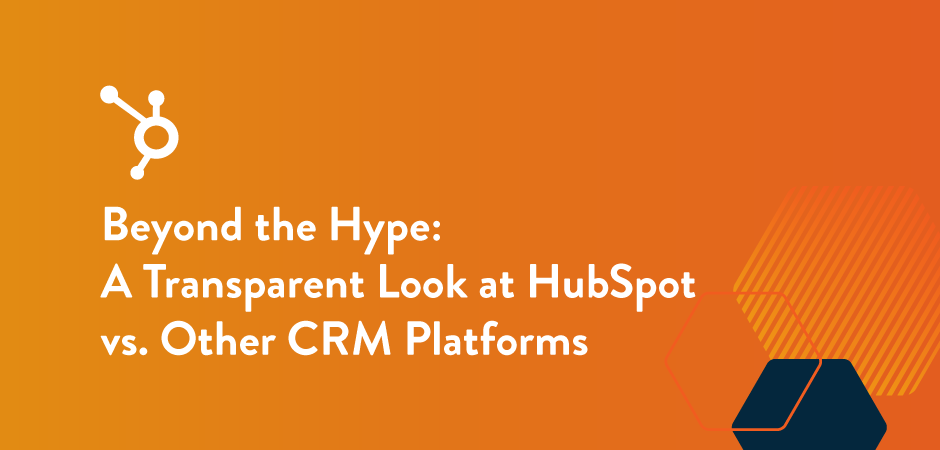
Choosing the right marketing automation and CRM platform is a critical decision that can significantly impact your business’s ability to attract, convert, and retain its customers. One name you may have heard of before is HubSpot, a major player in the space — and for good reason. This comprehensive, all-in-one platform supports marketing, sales, customer service, content management, and operations to boot.
But as much as we value HubSpot’s robust capabilities here at HiveHouse, it’s not always the right fit for every situation.
This blog is designed to help you understand not just what HubSpot does well, but also when another platform might make more sense for your business needs. We’ll explore HubSpot’s strengths, where it may fall short, and how it stacks up against competitors like Mailchimp, Constant Contact, SharpSpring, Pardot, Marketo, Salesforce, and Zoho.
Let’s dive in.
When is HubSpot the Right Fit?
There’s a reason why you’ve heard the name HubSpot before – this tool’s all-in-one approach, powerful automation, exceptional customer support, and scalability make it a standout choice in a crowded market.
Businesses Looking to Centralize Their Tech Stack & Streamline Operations
Ask anyone and they’ll tell you that one of HubSpot’s greatest strengths lies in its all-in-one functionality. If your business struggles with juggling different, disconnected systems like Mailchimp for email campaigns and Salesforce as a CRM, then HubSpot is the perfect solution as a fully-integrated platform that does it all in one place.
Organizations Who Want to Improve Operational Efficiency Without Internal Development Resources
Since HubSpot offers some of the most powerful-yet-accessible automation tools on the market, anyone is able to easily build and manage workflows for lead nurturing, sales follow-ups, personalized marketing, and so much more. These plug-and-play solutions don’t require hefty technical expertise or custom development to work in a variety of configurations.
Companies Who Value Detailed Reporting & ROI Tracking Across the Organization
For those who need end-to-end customer visibility with real-time analytics and custom reporting, HubSpot is a playground of possibilities. HubSpot provides a complete view of the customer journey — from marketing interactions, through sales activity, to support tickets, and beyond. This level of transparency is essential for teams who are determined to make data-driven decisions.
Teams Without a Dedicated IT Department
Because HubSpot is consistently recognized for its intuitive interface, educational resources, and responsive customer support, it’s known as an approachable solution for non-technical users. Plus, it often provides a smoother onboarding experience than many other enterprise platforms!
If you’re looking for a platform that can drive business growth, streamline operations, and deliver exceptional customer experiences, HubSpot is a hard solution to beat.
When is HubSpot Possibly Not the Best Fit?
Still, there are situations where HubSpot may not be the best option right off the bat. It all comes down to asking yourself a few basic questions about what your business needs — and then seeing how HubSpot stacks up to the other options available out there. Here are a few reasons HubSpot may not be the right solution for your business right now.
Businesses Looking for a Basic Email Marketing Solution
For businesses focused solely on sending newsletters or simple email campaigns, HubSpot’s feature set may be more than necessary, and more expensive than suitable alternatives.
Email Marketing Alternatives to Consider:
- Mailchimp: A strong option for simple email marketing and basic automation.
- Constant Contact: Popular with small businesses and nonprofits for straightforward campaign needs.
Companies Who Require Highly-Customized, Enterprise-Level Workflows
HubSpot Enterprise offers powerful automation, segmentation, and permissions, which is often enough for most teams. But for organizations that require highly tailored workflows, deeply embedded processes, or industry-specific functionality, Salesforce stands out. Its platform is incredibly customizable, with the ability to adapt nearly every element to your business. However, unlocking that level of flexibility often means layering on multiple subscriptions and relying on a dedicated admin or development team to manage the system effectively, so it does require quite the commitment from the start.
Enterprise Solutions to Consider:
- Salesforce: Industry leader in customization, ideal for companies with different complex needs and the financial and operational resources to support them.
Smaller Organizations Working with a Limited Budget
HubSpot’s pricing scales with usage and feature access, which can become costly for businesses just starting out or operating under tight budgets. There are other platforms out there that offer basic CRM and automation features at a lower price point.
CRM Alternatives to Consider:
- SharpSpring: A budget-conscious all-in-one solution with marketing automation and CRM features.
- Zoho CRM: Offers extensive capabilities at a more affordable price point, though it may require a steeper learning curve.
At a Glance: HubSpot vs. the Competition
| Use Case | Choose HubSpot | Consider These Alternatives |
| Integrated, all-in-one platform | ✔ | ❌ |
| Basic email marketing | ❌ | Mailchimp, Constant Contact |
| Cost-effective alternatives | ❌ | SharpSpring, Zoho CRM |
| Enterprise-level customization | ✔ | Salesforce |
| Easy-to-use CRM with strong support | ✔ | ❌ |
| Unified reporting and ROI tracking | ✔ | ❌ |
Additional Consideration: Long-Term Value and Ecosystem Support
One often-overlooked advantage of choosing HubSpot is the strength of its broader ecosystem. From certified agency partners and developers to its massive library of integrations and HubSpot Academy training resources, the platform is built not just to serve your needs today, but to support long-term growth and user adoption.
Whether you’re onboarding new team members, scaling your operations, or launching advanced campaigns, HubSpot’s accessible support structure and vibrant community can dramatically shorten your learning curve. Plus, its transparent CRM pricing model (while sometimes higher upfront) often leads to reduced costs down the road by eliminating the need for third-party add-ons or technical consultants required by more fragmented solutions.
Final Thoughts: HubSpot Is Powerful, But It’s Not One-Size-Fits-All
HubSpot is an excellent platform for many organizations, especially for those that want an intuitive, all-in-one solution that scales with their business. But it’s important to approach your tech stack thoughtfully. What works for one business might not work for another.
At HiveHouse, we help clients make these decisions every day. We’re a HubSpot partner, but we also believe in honest assessments. If you’re evaluating your CRM or marketing automation tools, we invite you to download our HubSpot Onboarding Checklist to see if the platform aligns with your current goals and budget.
For additional guidance, feel free to contact our team. We’re here to help you make the best choice — even if that choice isn’t HubSpot.
Still Looking For Answers? We Can Help!
Get the latest news
Blog Topics
- AI
- Analytics
- Branding & Identity
- Budget
- Construction
- Content Marketing
- Conversion Rate Optimization
- Email Marketing
- HubSpot
- Inbound Marketing
- Lead Generation
- Marketing Strategy
- News/Events
- Paid Search & PPC
- Recruiting
- Sales & Marketing
- Sales Enablement
- Search Engine Marketing
- Search Engine Optimization
- Social Media
- Thought Leadership
- Uncategorized
- Usability
- Video Marketing
- Web Hosting
- Website Design
